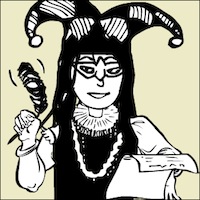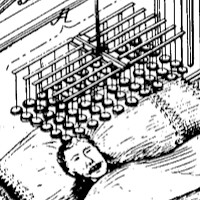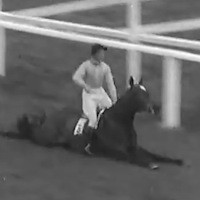Klaus Barbie - the Butcher of Lyon

Klaus Barbie will always be remembered as the “Butcher of Lyon.” He was responsible for the torture and death of thousands of people. On January 19, 1983, he was finally arrested and extradited to France.
Klaus Barbie was born into a Roman Catholic family in Bad Godesberg, near Bonn, on October 25, 1913. His father fought in the First World War where he was hit by a bullet in his neck. He returned home from the war a bitter, dejected man and he became an abusive alcoholic parent. He worked in the office at Noder School, an elementary school where Barbie was a pupil.
In 1933, Barbie’s father and brother both died. His father’s death left him unable to financially continue his studies. In September 1935 he joined the Sicherheitsdienst (security service), a special branch of the SS and the intelligence gathering arm of the Nazi party. In 1940, he was sent to The Hague (Den Haag), where his main task was to arrest Jews and German political refugees who fled to the Netherlands. In 1942, he was sent to Dijon and in November of the same year he was sent to Lyon, where he became the head of the local Gestapo.
He personally tortured prisoners and is blamed for the deaths of 4,000 people. As dedicated sadist he was responsible for many individual atrocities, including the capture and deportation to Auschwitz of forty-four Jewish children hidden in the village of Izieu, Klaus Barbie owed his postwar notoriety primarily to one of his “cases”, the arrest and torture unto death of Jean Moulin, one of the highest ranking member of the French Resistance.
Jean Moulin was mercilessly tortured by Klaus Barbie and his men. Hot needles where shoved under his fingernails. His fingers were forced through the narrow space between the hinges of a door and a wall and then the door was repeatedly slammed until his knuckles broke.
Screw-levered handcuffs were placed on Moulin and tightened until they broke his wrists. He would not talk despite how much he was whipped and beaten. His face was was unrecognizable from all the torture. Jean Moulin's broken body, unconscious most of the time, was shown to other resistance leaders who were being interrogated at Gestapo headquarters. It was the last time Moulin was seen alive.
On behalf of his cruel crimes and especially for the Moulin case, Barbie was awarded by Hitler the “First Class Iron Cross with Swords.”
After the war, Barbie began working for the CIC in spring 1947. He was protected by American intelligence agents because of his “police skills” and anti-communist zeal; he was successful in penetrating communist cells in post-war Germany.
In 1950 he fled to Bolivia with his wife and children to escape prosecution. The US aided him, and later had to apologize to France for this deception.
He lived in Bolivia as a businessman under the name of Klaus Altmann. He was identified in Bolivia in the early 1970’s by the Nazi hunters Beate and Serge Klarsfeld. It took until February 1983 for the Bolivian government, after long negotiations, extradited Barbie to France to stand trial for war crimes.
On the 3 July 1987 Klaus Barbie was sentenced to life imprisonment for crimes against humanity. Nine jurors and three judges found Barbie – known as the “Butcher of Lyons” – guilty of the 341 separate charges that were brought against him at the court in Lyon.
Klaus Barbie was born into a Roman Catholic family in Bad Godesberg, near Bonn, on October 25, 1913. His father fought in the First World War where he was hit by a bullet in his neck. He returned home from the war a bitter, dejected man and he became an abusive alcoholic parent. He worked in the office at Noder School, an elementary school where Barbie was a pupil.
In 1933, Barbie’s father and brother both died. His father’s death left him unable to financially continue his studies. In September 1935 he joined the Sicherheitsdienst (security service), a special branch of the SS and the intelligence gathering arm of the Nazi party. In 1940, he was sent to The Hague (Den Haag), where his main task was to arrest Jews and German political refugees who fled to the Netherlands. In 1942, he was sent to Dijon and in November of the same year he was sent to Lyon, where he became the head of the local Gestapo.
He personally tortured prisoners and is blamed for the deaths of 4,000 people. As dedicated sadist he was responsible for many individual atrocities, including the capture and deportation to Auschwitz of forty-four Jewish children hidden in the village of Izieu, Klaus Barbie owed his postwar notoriety primarily to one of his “cases”, the arrest and torture unto death of Jean Moulin, one of the highest ranking member of the French Resistance.
Jean Moulin was mercilessly tortured by Klaus Barbie and his men. Hot needles where shoved under his fingernails. His fingers were forced through the narrow space between the hinges of a door and a wall and then the door was repeatedly slammed until his knuckles broke.
Screw-levered handcuffs were placed on Moulin and tightened until they broke his wrists. He would not talk despite how much he was whipped and beaten. His face was was unrecognizable from all the torture. Jean Moulin's broken body, unconscious most of the time, was shown to other resistance leaders who were being interrogated at Gestapo headquarters. It was the last time Moulin was seen alive.
On behalf of his cruel crimes and especially for the Moulin case, Barbie was awarded by Hitler the “First Class Iron Cross with Swords.”
After the war, Barbie began working for the CIC in spring 1947. He was protected by American intelligence agents because of his “police skills” and anti-communist zeal; he was successful in penetrating communist cells in post-war Germany.
In 1950 he fled to Bolivia with his wife and children to escape prosecution. The US aided him, and later had to apologize to France for this deception.
He lived in Bolivia as a businessman under the name of Klaus Altmann. He was identified in Bolivia in the early 1970’s by the Nazi hunters Beate and Serge Klarsfeld. It took until February 1983 for the Bolivian government, after long negotiations, extradited Barbie to France to stand trial for war crimes.
On the 3 July 1987 Klaus Barbie was sentenced to life imprisonment for crimes against humanity. Nine jurors and three judges found Barbie – known as the “Butcher of Lyons” – guilty of the 341 separate charges that were brought against him at the court in Lyon.

Related Articles
Editor's Picks Articles
Top Ten Articles
Previous Features
Site Map
Content copyright © 2023 by Carol Taller. All rights reserved.
This content was written by Carol Taller. If you wish to use this content in any manner, you need written permission. Contact Lane Graciano for details.







